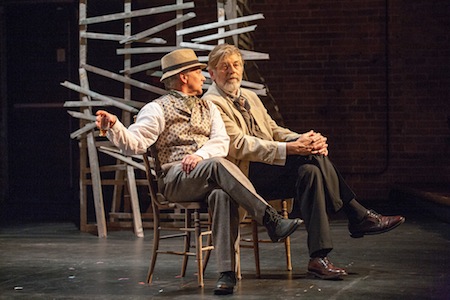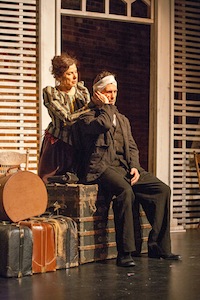
Exceptionally crafted performances light up the stage in The Seagull at Toronto’s Berkeley Theatre
For their production of Anton Chekhov’s The Seagull, the Chekhov Collective has utilized the Chekhov Technique. (Phew! Three “Chekhovs” in one sentence!) What the technique boils down to this: in-depth awareness of body and psychology, forging them into tools to bring characters to life.
This, you can imagine, takes a great deal of time. Those Russian masters would work on theatrical productions for years before presenting them to audiences. Keeping this tradition alive, the Chekhov Collective’s production is a carefully wrought gem. After a year of preparation, the fruits of their labour now grace the stage at the Berkeley Street Theatre.
All four acts take place at a lakeside country estate. In the first Act, Konstantine tries to present his play to a small gathering of friends and family. He is a young writer, distrustful of artistic conventions, and seeks to find “new forms” for drama. His mother, Irina (an actress), loves him dearly but finds his ideas and erratic behaviour tedious. Her flippant reaction to his unconventional play—which he hoped would impress her—throws him into a fit of rage.
From this point on, all of the characters struggle with notions of art and life, practicalities and philosophy, and it is all very funny and deeply haunting.
 These characters probe each other in the hope of discovering the essence of someone else, experience life from some other perspective, but ultimately they discover this truth: regardless of circumstances—age, gender, profession—we all must suffer. All of us, bound by the same temporal limitations, have a small window of opportunity to experience what we call life. And it is a constant struggle to give it value and purpose.
These characters probe each other in the hope of discovering the essence of someone else, experience life from some other perspective, but ultimately they discover this truth: regardless of circumstances—age, gender, profession—we all must suffer. All of us, bound by the same temporal limitations, have a small window of opportunity to experience what we call life. And it is a constant struggle to give it value and purpose.
Chekhov is far easier to watch than he is to read. There is beauty in the language, certainly, but on the page, it’s tricky following who’s saying what and to whom. The characters in Russian literature go by so many different names. There are family names, given names, nicknames and a whole bunch of suffixes and variations depending on gender and social standing… it can be very confusing. With this play in particular, there are lines that seem, on the page, to be non-sequiturs. Reading it, I felt as if I was always missing something.
These problems vanish completely when the play is performed. For one thing, the names don’t cause any problems because you can clearly identify who’s speaking to whom. And those jarring leaps from one subject to another: they become natural—and, more importantly, meaningful—when in the context of a performance.
Chekhov called this a comedy and it is, indeed, quite funny. But there is much anger and pain beneath the humour. There is also some genuine happiness, but the play gets heavier as it progresses. By the fourth Act, there is a pervasive sense of doom that gave me chills. Even though I knew what the final moments held in store for me, I still held my breath, hoping for some alternative.
Rob Gray’s set is simple and evocative. Practically, it suggests a white-stained veranda, but it also serves a symbolic purpose. The structure begins, at one end of the stage, fresh and solid, but it becomes increasingly faded and misshapen as it extends across. It is a reflection of life. Over the course of the play, we are shown how fragile and temporary we all are, despite how pristine and immortal we seem in youth.
Each performance is an individual masterpiece. As hyperbolic as that sounds, I am sincere. This isn’t the result of a standard six weeks of line memorization and blocking. This is more refined. Every glance, every shudder, each laboured breath and weighty silence is charged with emotion. Even if they aren’t the obvious focus of a moment, there was something deeply compelling in whichever face caught my eye.
It is usually my intention to highlight key performances and name those who have most impressed me, but that just isn’t possible here. Each performance is poignant and integral to the whole. To single out any one of them would be a disservice to this company’s achievement.
I’ve not often experienced something so full of nuance, so perfect in its complexity, and so amusing while it tore my heart out.
Details:
- The Seagull is playing at the Berkeley Street Theatre, Upstairs (26 Berkeley Street) until March 23.
- Shows run Tuesday through Saturday at 8PM, with Saturday and Sunday Matinees at 2PM
- Tickets range from $36 to $42
- Tickets can be purchased at the Box Office in person, by phone (416.368.3110) or online
Photos of Sean Sullivan and Greg Ellwand (above), Rena Polley and Riley Gilchrist (below) by Victoria Carr
